#HCGDietProtocols
Explore tagged Tumblr posts
Link
#fastingtips#hcgdiet#hcgdietandfasting#hcgdietandintermittentfasting#hcgdietcoach#hcgdietcoaching#hcgdieteating#hcgdieteatingplan#hcgdietfoods#hcgdietinjections#hcgdietmaintenance#hcgdietp3#hcgdietphase2#hCGDietphase3#hcgdietplan#hcgdietprotocol#HCGDietProtocols#hcgdietshots#hcgdietstabilization#hcgdietweightloss#hcgweightlosscoach#intermittentfasting#intermittentfastingandhcgdiet#medicalweightloss#medicalweightlossprotocol
0 notes
Link
👋 Are you looking for a weight loss solution that actually works? Look no further than the HCG Diet by Dr. Simeon. This comprehensive guide will provide you with all the information you need to know about this popular diet plan. 👨⚕️ Dr. Simeon's HCG Diet involves a low-calorie diet combined with daily injections of the hormone human chorionic gonadotropin (HCG). This hormone is believed to help suppress hunger and promote weight loss. The diet also includes specific food choices and portion sizes. 📈 Many people have reported significant weight loss results with the HCG Diet. However, it's important to note that the diet is not without controversy and should be approached with caution. This guide will provide a balanced overview of the diet, its potential benefits and drawbacks, and tips for success.1. The Science behind the HCG Diet: Understanding the Hormone and its Role in Weight LossDiscover the science behind the HCG diet and how the hormone plays a crucial role in weight loss. HCG, or human chorionic gonadotropin, is a hormone produced during pregnancy that helps regulate metabolism. It targets stored fat for energy Increases metabolism Suppresses appetite Research shows that HCG injections combined with a low-calorie diet can lead to significant weight loss. However, HCG supplements and drops have not been proven effective and may even be harmful. Always consult a healthcare professional before starting any diet. Understand the science behind the HCG diet to make informed decisions about your weight loss journey. 🧐🔬💉🥗🚫💊2. Dr. Simeon's Protocol: A Step-by-Step Guide to the HCG Diet PlanDr. Simeon's Protocol is a popular HCG diet plan. Here's a step-by-step guide to help you get started. 🍴 Phase 1: Loading days. Eat high-fat foods for two days while taking HCG drops. 🥗 Phase 2: Low-calorie diet. Eat 500-800 calories per day of specific foods for 3-6 weeks. 🚫 Avoid sugar, starch, and fats. Drink plenty of water and herbal tea. 🏋️♀️ Exercise is not required but recommended. Walking, yoga, and light weights are good options. 🍓 Phase 3: Stabilization. Gradually increase calorie intake and add new foods for 3 weeks. 🥩 Phase 4: Maintenance. Continue to avoid sugar and starch, but gradually add more foods. 📈 Dr. Simeon's Protocol claims to help with weight loss and metabolism. Consult a doctor before starting. 💪 Stick to the plan, track progress, and stay motivated. Good luck on your HCG journey!3. HCG Diet Phases Explained: From Loading Days to Maintenance PhaseHCG Diet Phases Explained: The HCG diet has three phases: Loading, Low-Calorie, and Maintenance. During the Loading phase, you eat high-fat foods for two days. In the Low-Calorie phase, you eat only 500 calories for 3-6 weeks. In the Maintenance phase, you gradually increase calories and reintroduce foods. The Loading phase is essential to prepare your body for the low-calorie phase. The Low-Calorie phase is the most challenging but also the most rewarding. You'll lose weight quickly. The Maintenance phase is crucial to keep the weight off and stabilize your metabolism. During the HCG diet, you'll consume a hormone called Human Chorionic Gonadotropin (HCG). The hormone helps suppress hunger and maintain muscle mass while losing weight. You can take HCG through injections, drops, or pellets. The HCG hormone helps your body burn fat instead of muscle for energy. The hormone also helps regulate your metabolism, so you don't gain weight back as quickly. The HCG diet is not for everyone and should only be done under the supervision of a healthcare professional. It's essential to follow the diet plan strictly to achieve the desired results. Consult with your doctor before starting any diet or weight loss program. The HCG diet is not suitable for pregnant women or people with certain medical conditions. It's crucial to drink plenty of water and take supplements to ensure proper nutrition. Overall, the HCG diet can be an effective way to lose weight quickly and maintain a healthy lifestyle. However, it's essential to understand the phases and follow the plan carefully to achieve the desired results. 🥗🥩🥦🥚🍓🥤4. HCG Diet Food List: What to Eat and What to Avoid While on the DietWhen on the HCG diet, it's essential to stick to a strict food list to achieve optimal results. Here's what you should eat: Lean proteins such as chicken, fish, and lean beef Non-starchy vegetables like spinach, lettuce, and broccoli Fruits like apples, oranges, and strawberries Grains like quinoa and brown rice in moderation Herbs and spices for added flavor Avoid these foods while on the HCG diet: Sugar and sugary foods like candy and soda Processed foods like chips and snack cakes Starchy vegetables like potatoes and corn Fatty meats like bacon and sausage High-fat dairy products like cheese and butter Remember to drink plenty of water and stay hydrated while on the HCG diet. Happy dieting! 🍎🥦💪5. HCG Diet Side Effects: Common Symptoms and How to Manage ThemCommon Symptoms and How to Manage Them Nausea and vomiting are common side effects of the HCG diet. Drink plenty of water and eat small, frequent meals to manage these symptoms. Headaches are also common. Try taking over-the-counter pain relief and avoid caffeine. Constipation can occur due to the low fiber intake. Increase your fiber intake by eating more vegetables and fruits. Leg cramps can occur due to low potassium levels. Eat potassium-rich foods like bananas and avocados. Menstrual changes may occur. Consult your doctor if you experience any abnormal changes. It's important to remember that these side effects are temporary and can be managed with proper care. Always consult your doctor before starting any new diet or exercise program. 🌟Tip: Keep a food diary to track any symptoms and make adjustments to your diet accordingly.🌟6. HCG Diet Success Stories: Real People's Experiences with the Program Discover the inspiring HCG diet success stories of real people who have transformed their bodies and lives with this program. 👩🦰 Meet Jane, who lost 30 pounds in just 6 weeks and regained her confidence. 👨🦲 Hear John's story of losing 50 pounds in 3 months and overcoming his health issues. 👩🦱 Learn how Sarah achieved her dream body and improved her energy levels with a 40-pound weight loss. These individuals have shared their experiences with the HCG diet, a low-calorie, high-protein program that involves taking HCG hormone supplements and following a strict meal plan. 💪 They all faced challenges along the way, such as cravings and plateaus, but persevered with the support of their coaches and community. 🥗 They also embraced healthy habits, like meal prepping and exercising regularly, to sustain their results. Not only did they shed unwanted pounds, but they also improved their overall health and well-being. 🩺 Many reported lower blood pressure, cholesterol, and blood sugar levels. 🧠 They also experienced mental clarity, better sleep, and reduced stress. If you're considering the HCG diet, these success stories can provide inspiration and motivation to achieve your own goals. 🤔 However, it's important to consult with a healthcare professional and do your research before starting any new diet or exercise program. 👍 With dedication and commitment, you too can join the ranks of HCG diet success stories. 7. Frequently Asked Questions about the HCG Diet: Answering Your Concerns and MisconceptionsFAQs about the HCG Diet 🤔 What is the HCG Diet? It's a weight loss program that combines a low-calorie diet with the hormone HCG. HCG is believed to suppress hunger and promote fat loss. 👉 Is the HCG Diet safe? The FDA has not approved HCG for weight loss, and there is no scientific evidence to support its effectiveness or safety. 🍎 What foods can I eat on the HCG Diet? The diet typically includes lean protein, vegetables, and fruit. Processed foods, sugar, and starch are not allowed. 🤷♀️ How much weight can I expect to lose? The amount of weight loss varies, but most people lose 1-2 pounds per day during the first few weeks. 💊 Do I need to take HCG injections? HCG injections are the most common form of the hormone used in the diet, but some people use drops or pills. 🤢 What are the side effects of the HCG Diet? Common side effects include headaches, fatigue, and constipation. More serious side effects are rare but can include blood clots and gallstones. 💰 How much does the HCG Diet cost? The cost varies depending on the form of HCG used and the length of the program. It can range from a few hundred to several thousand dollars. 🙅♀️ Is the HCG Diet recommended? The HCG Diet is not recommended by most medical professionals due to the lack of scientific evidence and potential risks. Consult with your doctor before starting any weight loss program. In conclusion, the HCG diet by Dr. Simeon is a comprehensive weight loss program that has proven to be effective for many people. By following the protocol, users can expect to lose weight quickly and safely. However, it is important to consult with a healthcare professional before starting the diet. Overall, the HCG diet is a great option for those looking to jumpstart their weight loss journey. With a combination of a low-calorie diet and HCG injections, users can see significant results in a short amount of time. Remember to follow the protocol closely and stay committed to your weight loss goals. 💪🏼🥦👍🏼 https://fastdiet.net/hcg-diet-by-dr-simeon-a-comprehensive-guide/?_unique_id=64891a28a628d
#Uncategorised#Dr.SimeonsProgram#HCGDietProtocol#HCGInjections#Phase2FoodList#rapidweightloss#aiomatic_0
0 notes
Text
Intermittent Fasting and the Hcg Diet
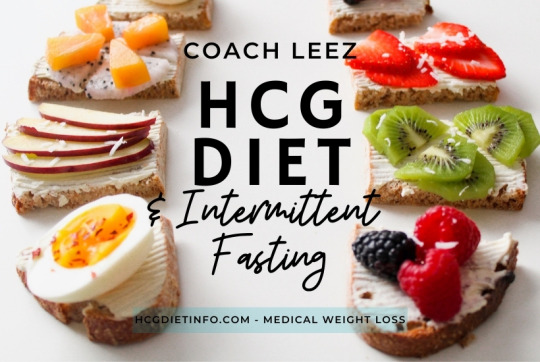
Intermittent fasting is becoming quite popular as a weight control tactic. It involves narrowing your eating "window" to 8 or fewer hours a day. Many have reported success at weight control with this tactic. Interesting enough, intermittent fasting is built into Phase 2 of the Hcg diet, if you follow the menu pattern of 2 meals a day, lunch and dinner. It may not be a significant factor, as one can split up the two meals throughout the day without slowing the weight loss, but it is worth noting that it is built into the instructions of the weight loss phase, even if coincidentally. When it comes to Phase 3 of the protocol, for stabilization and preparing for maintenance, it could greatly hinder results. HCG is a hormonal protocol, and intermittent fasting can have some negative hormonal effects. For those considering combining IF with your stabilization 21 days of P3, here is why I think it would be better to wait until P4 to give this a try. The goal of P3 is to stabilize at your ending weight on P2 of the HCG diet. In order to do that, you have to eat the right kinds of foods (good oils, all proteins, non-starchy veggies and some fruit) and you have to eat enough of them. After P2, most people's capacity is small, and many struggle to get enough food in, especially the first few days. Intermittent fasting rules make that even harder. The idea behind intermittent fasting is that having less time to eat will restrict your food intake. That is where the problem likes. You do not want to be cutting back on food intake in P3. In fact, you want to do just the opposite.
Why Intermittent Fasting Won't Work with P3:
At the end of P2, your metabolism is running at a higher more efficient level than previous to the diet. Your furnace is demanding fuel. You want to answer those demands so that the furnace keeps burning at a high rate. If that can be accomplished, you will go on being able to eat more calories than you did before without gaining weight. Your metabolism has been reset, but you can slow it down again by under-eating in P3, or ignoring hunger and waiting too long to eat. You need to get in touch with your hunger and satisfaction signals so that you eat enough and often enough to keep that revved up metabolism burning. You are learning how to fuel your body during P3. Paradoxically, the biggest issue with weight gain in P3 is failing to eat enough. This is because the fear of regain is often very strong. But that fear must be overcome. You can trust the process. People are often amazed at how much they can eat during P3 and still stay in their 2 pound window. Dr. Simeons said that in P3, eat whatever you like as long as you avoid starch and sugar. You have been given a great gift through the elimination diet aspect of P2---cravings will be gone. This gives you a rare opportunity to learn your hunger and satisfaction signals without cravings confusing the landscape. You need to learn how to eat enough, and to eat when hungry, not famished, as waiting too long almost ensures you will overeat. P3 is a golden opportunity to shift your food relationship to a healthy fuel-based focus where you recognize and address your hunger in time, and appropriately. For more information on how to recognize your hunger/satisfaction signals, please see this article: How to Know When You Are Hungry. Delaying eating until later in the day interferes with your hunger signals. Every hour after waking that you delay eating, slows down your metabolism. This is counter productive to your P3 goals. To keep your metabolism humming in P3, try to get some calories in you within an hour of awakening. It doesn't have to be a lot, but it needs to be nourishing. Something with some protein and a little fat. It could be something like coffee with collagen and MCT oil. (Froth it with a little sunflower lecithin---it gets very creamy), a small protein shake, or if you can handle solids-- some full fat cottage cheese or greek yogurt and berries, or a couple strips of bacon and some avocado. This little calorie boost early in the day wakes up your digestive system and you are off and running. There will be plenty of time to experiment with intermittent fasting once you have completed your 21 days of P3. So relax and enjoy all the freedom of variety and bounty encouraged in P3 knowing that it works, and will set you up for success in P4 (maintenance). Read the full article
#fastingtips#hcgdiet#hcgdietandfasting#hcgdietandintermittentfasting#hcgdietcoach#hcgdietcoaching#hcgdieteating#hcgdieteatingplan#hcgdietfoods#hcgdietinjections#hcgdietmaintenance#hcgdietp3#hcgdietphase2#hCGDietphase3#hcgdietplan#hcgdietprotocol#HCGDietProtocols#hcgdietshots#hcgdietstabilization#hcgdietweightloss#hcgweightlosscoach#intermittentfasting#intermittentfastingandhcgdiet#medicalweightloss#medicalweightlossprotocol
0 notes
Text
Intermittent Fasting and the Hcg Diet
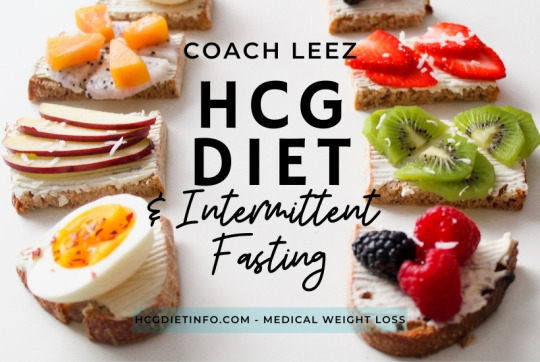
Intermittent fasting is becoming quite popular as a weight control tactic. It involves narrowing your eating "window" to 8 or fewer hours a day. Many have reported success at weight control with this tactic. Interesting enough, intermittent fasting is built into Phase 2 of the Hcg diet, if you follow the menu pattern of 2 meals a day, lunch and dinner. It may not be a significant factor, as one can split up the two meals throughout the day without slowing the weight loss, but it is worth noting that it is built into the instructions of the weight loss phase, even if coincidentally. When it comes to Phase 3 of the protocol, for stabilization and preparing for maintenance, it could greatly hinder results. HCG is a hormonal protocol, and intermittent fasting can have some negative hormonal effects. For those considering combining IF with your stabilization 21 days of P3, here is why I think it would be better to wait until P4 to give this a try. The goal of P3 is to stabilize at your ending weight on P2 of the HCG diet. In order to do that, you have to eat the right kinds of foods (good oils, all proteins, non-starchy veggies and some fruit) and you have to eat enough of them. After P2, most people's capacity is small, and many struggle to get enough food in, especially the first few days. Intermittent fasting rules make that even harder. The idea behind intermittent fasting is that having less time to eat will restrict your food intake. That is where the problem likes. You do not want to be cutting back on food intake in P3. In fact, you want to do just the opposite.
Why Intermittent Fasting Won't Work with P3:
At the end of P2, your metabolism is running at a higher more efficient level than previous to the diet. Your furnace is demanding fuel. You want to answer those demands so that the furnace keeps burning at a high rate. If that can be accomplished, you will go on being able to eat more calories than you did before without gaining weight. Your metabolism has been reset, but you can slow it down again by under-eating in P3, or ignoring hunger and waiting too long to eat. You need to get in touch with your hunger and satisfaction signals so that you eat enough and often enough to keep that revved up metabolism burning. You are learning how to fuel your body during P3. Paradoxically, the biggest issue with weight gain in P3 is failing to eat enough. This is because the fear of regain is often very strong. But that fear must be overcome. You can trust the process. People are often amazed at how much they can eat during P3 and still stay in their 2 pound window. Dr. Simeons said that in P3, eat whatever you like as long as you avoid starch and sugar. You have been given a great gift through the elimination diet aspect of P2---cravings will be gone. This gives you a rare opportunity to learn your hunger and satisfaction signals without cravings confusing the landscape. You need to learn how to eat enough, and to eat when hungry, not famished, as waiting too long almost ensures you will overeat. P3 is a golden opportunity to shift your food relationship to a healthy fuel-based focus where you recognize and address your hunger in time, and appropriately. For more information on how to recognize your hunger/satisfaction signals, please see this article: How to Know When You Are Hungry. Delaying eating until later in the day interferes with your hunger signals. Every hour after waking that you delay eating, slows down your metabolism. This is counter productive to your P3 goals. To keep your metabolism humming in P3, try to get some calories in you within an hour of awakening. It doesn't have to be a lot, but it needs to be nourishing. Something with some protein and a little fat. It could be something like coffee with collagen and MCT oil. (Froth it with a little sunflower lecithin---it gets very creamy), a small protein shake, or if you can handle solids-- some full fat cottage cheese or greek yogurt and berries, or a couple strips of bacon and some avocado. This little calorie boost early in the day wakes up your digestive system and you are off and running. There will be plenty of time to experiment with intermittent fasting once you have completed your 21 days of P3. So relax and enjoy all the freedom of variety and bounty encouraged in P3 knowing that it works, and will set you up for success in P4 (maintenance). Read the full article
#fastingtips#hcgdiet#hcgdietandfasting#hcgdietandintermittentfasting#hcgdietcoach#hcgdietcoaching#hcgdieteating#hcgdieteatingplan#hcgdietfoods#hcgdietinjections#hcgdietmaintenance#hcgdietp3#hcgdietphase2#hCGDietphase3#hcgdietplan#hcgdietprotocol#HCGDietProtocols#hcgdietshots#hcgdietstabilization#hcgdietweightloss#hcgweightlosscoach#intermittentfasting#intermittentfastingandhcgdiet#medicalweightloss#medicalweightlossprotocol
0 notes
Link
#hcgdiet#hcgdietcommentary#hcgdietdoctor#hcgdietplan#hcgdietprotocol#hcgdietresearch#hcgdietscience#hcghormone#hcgweightloss#healthymindset#howthehcgdietworks#medicalweightloss#weightlosstips#weightlossmindset#Weightlosstips
0 notes
Link
#alcoholanddiet#alcoholandweightloss#alcoholweightloss#hcgandalcohol#hcgandbeer#hcgandwine#hcgdietallowedfoods#hcgdietandalcohol#hcgdietcoach#hcgdietcoaching#hcgdietfamily#hcgdietfoodlist#hcgdietfoods#hcgdietprotocol#hcgdietquestions#hcgdietsupport#hcgweightloss#hcgweightlossfoods#losingweightwithalcohol
0 notes
Text
Cycling vs Rounds - is it an Effective HCG Diet Strategy?

Over the years in the forums, there has been a steady contingent of those passing through that use the HCG protocol in a pattern that is called "cycling." Cycling is an adaptation of the idea in the protocol that is it safe to take what the protocol describes as an "unforeseen interruption" of Phase 2. This allowed break must last at least 4 days, but cannot be t longer than 14 days without redoing the 2 loading days again. In the cycling variation, this is expanded as multiple interruptions with periods of Phase 2 sandwiched in between. Generally, those taking the interruptions transition off as if they were ending the round, and then eat P3 style for the duration of the interruption, re-entering Phase 2 afterward. The idea is to keep going with Phase 2, taking periodic two week interruptions until you get to your goal. Here is how the unforeseen interruption is outlined in the protocol: If an interruption of treatment lasting more than four days is necessary, the patient must increase his diet to at least 800 calories by adding meat, eggs, cheese, and milk to his diet after the third day, as otherwise he will find himself so hungry and weak that he is unable to go about his usual occupation. If the interval lasts less than two weeks the patient can directly resume injections and the 500-Calorie diet, but if the interruption lasts longer he must again eat normally until he has had his third injection.--As written in Pounds and InchesTweet Some have interpreted that passage to allow for a series of two week breaks between 3-week periods of P2 until the goal weight is reached. The two week interruption is treated the same as Phase 3, following those dietary guidelines. The person then jumps right back into Phase 2 to continue on for a few more weeks. They may decide to do another 2 weeks of Phase 3 eating before re-entering Phase 2 yet another time, and so forth. The problem with this is that the body is never given enough time to rest and reset in between those high stress periods of very low calorie P2 eating. The protocol was carefully designed to allow hormones to come into balance according to the body's time table. To achieve that end, the shortest time between rounds is set at 6 weeks, and increases with each subsequent round. What I and others have observed is that many of those that follow the cycling strategy do not ever get to their goal weight. They may lose well for a couple of segments, then they seem to regain and have to start over. They usually blame themselves for losing control. I don't think this happens from lack of commitment or self-control. I think it happens because of the way the body works. I've had the challenge of coaching several people through a maintenance strategy after very extended rounds (no breaks, just months of Phase 2) and long cycled rounds. I'm sad to say that none were successful in maintaining their hard won progress, even though they gave it a herculean effort. I do not fault them (or my coaching) in the least. I believe that there are powerful body forces at work that we cannot manipulate to our own ends no matter how clever our best plans may be. I cannot say that no one has ever been successful with cycling. There have been a couple claims that it has worked, and I'm happy for their success. And of course, there is no data on what has happened outside those that report in the forums. I remember a cycler that eventually re-gained over 100 pounds, more than she had lost in the first place. That is heart breaking, and even more so that she blamed herself. ( I remember blaming myself every time some new diet I was trying didn't work. It never occurred to me then that a faulty plan could be the reason.) The reason I'm writing this article about it is so that any one reading thinks long and hard about whether to risk the very large investment they are making in this protocol to try to get to the finish line faster than recommended, only to have to do it again later. Because in the end its not just about getting there. Its about staying there once you make your goal. The cycling method shortcuts the waiting times that are called for between rounds. These allow the body to stabilize at a lower set point weight. By cutting that waiting time short, the regaining mechanisms are triggered, and the body sends out relentless strong cravings and hunger in a quest to stop what it perceives as starvation. That primordial response is a marvelous mechanism built into us that is meant to save us from starving--and only the extremely disciplined can overcome it with sheer determination, and even then, only for a time. You can read more about the importance of the waiting times in this article: https://hcgdietinfo.com/how-long-do-you-wait-between-hcg-diet-rounds-why/ Read the full article
#drsimeons#hcgcycling#hcgdiet#hcgdietcoach#hcgdietcoaching#hcgdietcycling#hcgdiethowto#hcgdietinterruptions#hcgdietplan#hcgdietprotocol#hcgdietrounds#hcgdietsupport#hcgplannedinterruption#hcgprotocol#hcgrounds#hcgweightloss#hcgweightlossprotocol#loadingdays#p2eating#poundsandinches#roundsvscycle#roundsvscycling
0 notes
Text
Can Alcohol Be Consumed with HCG Diet?
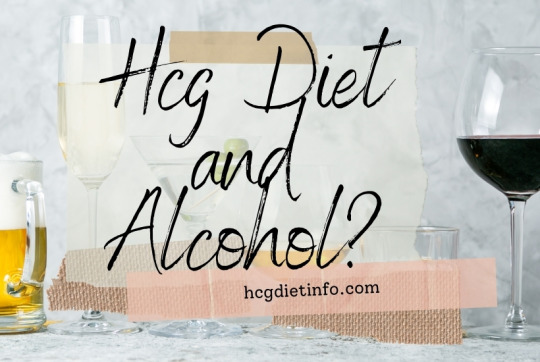

Photo by Kelsey Chance on Unsplash Per the National Institutes of Health (NIH) stats, almost two-thirds of US adults are either obese or overweight. This puts these individuals at risk of several health conditions like heart disease and diabetes. Likewise, many people struggle with weight; about 114 million spend around $60 billion, if not more, on weight loss products every year. But according to experts, the most effective approach for losing weight is by making lifestyle changes like eating healthy and monitoring portion size and regular exercises. One of the best diets for losing weight in recent years has been the HCG diet. Naturally, several questions surround this diet. This article will address whether it's okay to consume alcohol when using the HCG diet plan for weight loss. But before that, it's necessary to clarify a few things.
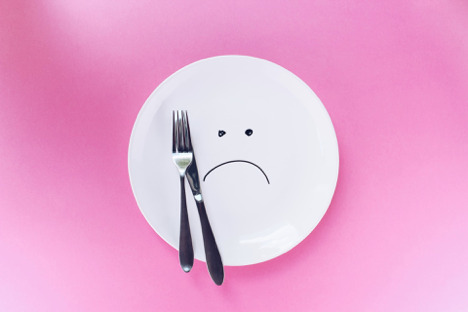
Photo by Thought Catalog on Unsplash What is The HCG Diet? The Human Chorionic Gonadotropin (HCG) is a hormone released in pregnant women to sustain the growing fetus. The US Food and Drug Administration (FDA) approved HCG for use in certain medical cases. Doctors most frequently prescribe it for the treatment of infertility. In terms of weight loss, the HCG diet comprises a considerably low-calorie diet combined with treatments of HCG, whether injected or administered orally. On average, this diet users undergo rapid weight loss of about 1 to 2 pounds each day. The explanation behind this occurrence is simple. HCG is present in both males and females even though women produce large quantities during pregnancy. This hormone stimulates the secretion of several different hormones. Therefore, it impacts the body's metabolism, digestion, muscle tissue, and several others. In essence, HCG doesn't directly induce weight loss. Instead, it alters how your body sheds weight, per Dr. Sharon Emma. In other words, the low-calorie diet initiates the weight loss and the HCG how the body completes the weight loss process, making it faster and more effective. The entire diet has three phases, namely: - Loading phase - Begin taking HCG and calorie-rich food for two days - Weight loss phase - Proceed with HCG and take only 500 calories/day for 3 -6 weeks - Maintenance phase - Halt HCG and slowly eat more calories without starch and sugar for three weeks. Now let's understand the science behind these complex bio-mechanisms before looking at how alcohol drinks may affect it and whether you can occasionally have your favorite Crown Royal Reserve while on an HCG diet. The Science Behind HCG Weight Loss When you start eating a low-calorie diet absent any medication, weight can drop very fast. However, this approach has one significant downside. Instead of shedding only fat on such a diet, the body will also lose muscle or lean tissue on a 500-calorie diet. Due to the heavy nature of muscle, you record a significant weight reduction when you step on the scale. This might sound good but is bad for the individual because it disrupts the metabolism leading to "rebound." Rebound means rapid weight gain following a weight reduction. But this is prevented with the HCG. HCG influences many glands and organs that respond to hormone levels in the body. Therefore, it can induce the production of testosterone, progesterone, and estrogen in men and women. Testosterone functions as an anabolic steroid and accounts for the results observed in HCG diets. In other words, it inhibits tissue catabolism when the body is fasting or starving. So how does alcohol affect this complex process? Let's find out.
HCG Diet and Alcohol

Photo by Mohau Mannathoko on Unsplash To be clear, the excessive drinking of alcohol does no good to the body. It overworks the liver and disrupts metabolism, which can lead to weight gain. But as far as the HCG diet goes, drinking alcohol can work against your goals, especially if you drink one too many glasses. Therefore, you want to avoid alcohol. But if you have to, drink tiny quantities. Remember, the key here is moderation. As a guideline, you can follow this recommendation below: - The volume of alcohol is 1.5 oz. for actual alcohol and 4.0 oz. of red or white wine. - Moderate means three non-beer and sugarless alcohol drinks per week Dr. Simeon included alcohol in his book Pounds and Inches. He stated, "If no carbohydrates whatsoever are eaten, fats can be indulged in somewhat more liberally and even small quantities of alcohols such as a glass of wine with meals, does not harm, but as soon fats and starch are combined things are very liable to get out of hand." Before you drink any alcohol on an HCG diet, it's vital to do so intentionally and responsibly by picking suitable alcoholic beverages. Ideally, you want to stay away from grain-based drinks that contain gluten, such as: - Beer - Grain-based vodka - Bourbon - Grain-based Gin - Whiskey Remember to limit your alcohol to no more than three days each week. Also, your maintenance phase is the most suitable for consuming alcohol. For instance, you can have a glass of cocktail or wine during Phase 3 of your HCG diet. Again, moderation is KEY! Risks Involved
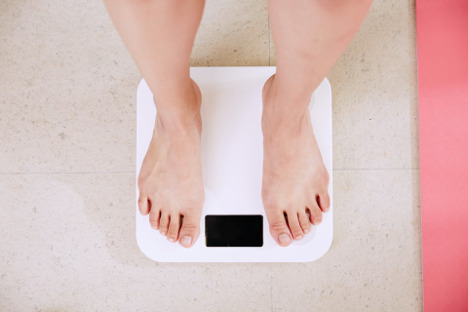
Photo by i yunmai on Unsplash There are significant risks associated with alcohol since alcohol is known to harm health in the long term. As such, you should remain mindful since it can give rise to bad eating habits and render it more difficult to exercise portion size during your HCG diet. Secondly, alcohol can increase your appetite for food. This also works against the low-calorie regimen of the HCG diet. Apart from these, it hinders the fat-burning process by reducing your metabolism, which counteracts the effects of the HCG hormone. These and many others are some of the reasons you want to avoid alcohol during your HCG diet. Conclusion Please make no mistake; alcohol intake while on the HCG diet impacts its effects. Assuming you consume any drink containing enough alcohol, you can expect your weight loss to stall for 3 to 6 days. It's even possible to gain some weight following alcohol intake. Therefore, the best cause of action that will ensure continuous weight loss is to stick to your diet and avoid heavy drinking. If you have to take alcohol, it’s better to wait until you get to the third stage of maintenance before you attempt combining alcohol with your diet. Read the full article
#alcoholanddiet#alcoholandweightloss#alcoholweightloss#hcgandalcohol#hcgandbeer#hcgandwine#hcgdietallowedfoods#hcgdietandalcohol#hcgdietcoach#hcgdietcoaching#hcgdietfamily#hcgdietfoodlist#hcgdietfoods#hcgdietprotocol#hcgdietquestions#hcgdietsupport#hcgweightloss#hcgweightlossfoods#losingweightwithalcohol
0 notes
Text
How Does the Hcg Diet Work: The Science Behind It

How does the Hcg Diet make you lose weight? The scientific explanation.
HCG is the pro-hormone that is found in all individuals, men and women alike. It is produced in large amounts by women during pregnancy and is known for being the catalyst hormone that stimulates the production of other hormones throughout the body. These in turn, effect the body's metabolism, muscle tissue, digestion, liver functions and much more. According to Dr. Sharon Emma (featured on Dr. Oz), HCG does not, cause you to lose weight. Instead, it changes HOW you lose weight. One Doctor's Explanation of How Hcg works for weight loss: It is no secret that hormone function and the balance of hormone functions in the body, is known to be one of the most common causes of weight challenges, especially severe obesity. HCG's role in weight loss, is in how it helps the body to balance out the delicate hormone system, which in turn enables the body to function at an optimal rate of performance.
What is HCG?
"HCG is “Human Chorionic Gonadotropin”. It is a protein hormone made by the placenta of pregnant women. It acts to stimulate precursor hormones in the body called Leuteinizing Hormone (LH) and Follicle Stimulating Hormone (FSH). The elevation of these hormones by HCG prevent the negative feedback loop of high hormone levels in the pregnant female, allowing hormones to go higher than normal. In non-pregnant and males, it serves to elevate hormone levels as well. To what degree the hormones are affected depend on the dose of HCG that is given." HCG is used for fertility in both males and females. In females, HCG given at high levels (10,000 IU) will simulate the spike in FSH that produces ovulation, therefore causing women to ovulate. This is used as a treatment for women with ovulatory disorders. In males, HCG given at high levels will dramatically increase testosterone production and will directly stimulate the leydig cells of the testes to produce sperm. This is used as a treatment for men with low sperm count. Though its use as a fertility drug has been clearly defined and FDA approved, HCG use for weight loss has yet to take this route. Since its discovery, its mechanism has been elusive, and its studies equivocal. The discovery goes back to the 1930’s. A medical experiment involving pubescent obese boys and “pregnancy hormone” led to an observation that these boys developed more muscularity and lost their obesity. The isolated HCG hormone was felt to be responsible. This led Dr. ATW Simeons to pursue an experimental treatment involving HCG injections, obese patients, and a special diet. The results of this study were outlined in the now infamous “Pounds and Inches” manuscript, written by Dr. Simeons in 1971. Once this manuscript became public, it was followed by numerous studies in the 1970’s and early 1980’s that sought to prove or disprove the scientific method of Dr. Simeons. However numerous researchers were unable to prove Simeons claims. Why? I can tell you. The studies looked at the difference in “weight loss” between patients on HCG and placebo not on HCG. The weight loss difference between users of HCG and non-users on the same diet, is about the same, therefore the FDA found no evidence to support the use of HCG for weight loss. However, there is a very clear reason why this was the result. HCG does not produce weight loss by itself. Rather, the diet is what drives the weight loss.- Dr. Sharon Emma Few people know that simple "pauses" in the body's natural functions can cause an inability for the body to process and use fat as energy; the natural purpose for fat. For example; A liver that does not get enough Choline can make it impossible for the liver to process fat. A digestive system that does not have enough of the right hormones to create enzymes cannot properly emulsify foods. This is just two examples out of dozens of possible hold-ups in the body when it comes to processing and expelling fat... that instead shift the body into fat storage mode causing weight gain and obesity. "HCG doesn't really do anything. It's the diet that makes you lose weight." When people state that "HCG hormone does not make you lose weight, but it is in fact the diet that makes you lose weight".... they are right! What they tend not to understand though is that HCG changes HOW you lose weight. According to Dr. Sharon Emma, HCG actually stimulates the follicles on glands which helps the body to maintain muscle tissue. For a scientific understanding, read The NEW HCG Diet which covers how HCG stimulates the follicles of muscle cells and stimulates and enhances the body's natural hormone cycle. The Diet IS in fact what makes you lose weight. HCG simply changes HOW your body loses that weight by keeping your body from going into "diet mode." Rather, the hormone stimulates your body's natural metabolic cycle to run continuously by maintaining muscle mass and stimulating the body's natural hormone cycle. Comparatively, other diets trigger your body to use muscle mass as fuel, and slow the body's metabolism in what is known as "starvation mode." How HCG Helps You Lose Weight What happens when someone does a very low calorie diet without medication? When someone “crash diets”, as would normally occur on a 500 calorie diet, one can drop weight very quickly. However, this weight consists of fat and muscle (lean tissue). Since muscle is very heavy, when you lose it, the scale will drop quickly. It looks good on the scale, but bad on the person, and it destroys the metabolism causing “rebound” or rapid regaining of weight lost. This scenario doesn’t happen with HCG, and when you keep reading, you’ll see why. HCG is an analog of many hormone precursors in the body. This means it stimulates the thyroid, ovaries (in females), testes (in males), and adrenal glands, as well as other tissues in the body that are affected by hormone levels. The main way that HCG is affecting weight loss is by stimulating the production of estrogen, progesterone, and testosterone, in both males and females. The latter hormone, being an anabolic steroid, is largely responsible for the results of HCG treatment. Testosterone, for example, acts to build muscle which is why it is a hormone that has been used for bodybuilding. However, in small amounts, it counteracts the catabolism, or “breakdown”, of bodily tissues during a state of starvation. This acts to preserve muscle tissue during dieting. This preservation of muscle tissue is so important because by preventing its breakdown we preserve metabolism and lean body structure including muscle. This may be why people who claim to lose weight with HCG claim to lose weight differently than with standard weight loss regimens. In standard regimens there is a loss of both fat AND muscle with an overall shrinking of body size. With an HCG regimen, people claim to undergo a reshaping of their body and removal of certain fat deposits. The evidence for this unique change in shape after HCG use with diet is not in the mere weight loss, but in the fact that HCG allows for selective fat loss and the sparing of muscle to produce a change in body composition, which produces a change in shape of the body. Therefore, HCG is not a magic injection. It does not cause weight loss by itself. In fact it doesn't quite fall into this category of drugs. Weight loss drugs that are approved for this purpose produce weight loss of 10% of body weight per year over placebo. HCG does not produce an increase in weight loss above placebo. Rather, like I explained, it changes how weight is lost. Therefore, it is a weight loss ADJUNCT, as I call it, that (during a dieting state) allows for the body to preferentially and selectively burn fat rather than muscle. In addition, many people overwhelmingly claim to be quite comfortable on very little calories with the HCG diet. This so-called appetite effect is very difficult to study. That’s because it has long been known that a ketogenic diet (a diet that produces ketones, like the Atkins diet) has an appetite dampening quality. So is that why HCG patients aren’t hungry? Well, unlike a ketogenic diet, my HCG patients are often not in an extreme state of ketosis, and if they are, it is very mild to moderate. In addition, a decrease in hunger occurs around 48 hours after start of the injections (around the time the hormone peaks in the bloodstream) whereas with a ketogenic diet, it takes nearly a week for hunger to subside. - Dr. Sharon Emma Read the research by Dr. Belluscio here. Read the full article
#hcgdiet#hcgdietcommentary#hcgdietdoctor#hcgdietplan#hcgdietprotocol#hcgdietresearch#hcgdietscience#hcghormone#hcgweightloss#healthymindset#howthehcgdietworks#medicalweightloss#weightlosstips#weightlossmindset#Weightlosstips
0 notes
Text
Can Alcohol Be Consumed with HCG Diet?
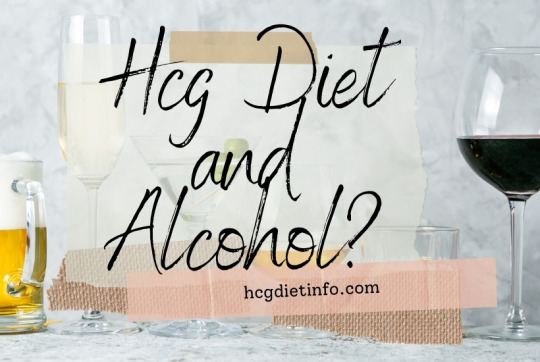

Photo by Kelsey Chance on Unsplash Per the National Institutes of Health (NIH) stats, almost two-thirds of US adults are either obese or overweight. This puts these individuals at risk of several health conditions like heart disease and diabetes. Likewise, many people struggle with weight; about 114 million spend around $60 billion, if not more, on weight loss products every year. But according to experts, the most effective approach for losing weight is by making lifestyle changes like eating healthy and monitoring portion size and regular exercises. One of the best diets for losing weight in recent years has been the HCG diet. Naturally, several questions surround this diet. This article will address whether it's okay to consume alcohol when using the HCG diet plan for weight loss. But before that, it's necessary to clarify a few things.
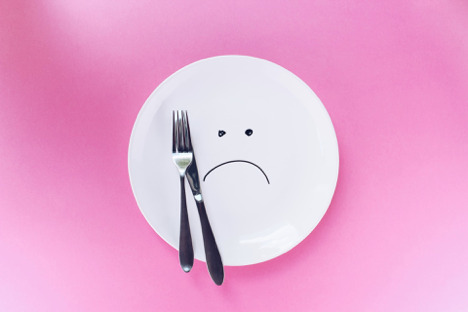
Photo by Thought Catalog on Unsplash What is The HCG Diet? The Human Chorionic Gonadotropin (HCG) is a hormone released in pregnant women to sustain the growing fetus. The US Food and Drug Administration (FDA) approved HCG for use in certain medical cases. Doctors most frequently prescribe it for the treatment of infertility. In terms of weight loss, the HCG diet comprises a considerably low-calorie diet combined with treatments of HCG, whether injected or administered orally. On average, this diet users undergo rapid weight loss of about 1 to 2 pounds each day. The explanation behind this occurrence is simple. HCG is present in both males and females even though women produce large quantities during pregnancy. This hormone stimulates the secretion of several different hormones. Therefore, it impacts the body's metabolism, digestion, muscle tissue, and several others. In essence, HCG doesn't directly induce weight loss. Instead, it alters how your body sheds weight, per Dr. Sharon Emma. In other words, the low-calorie diet initiates the weight loss and the HCG how the body completes the weight loss process, making it faster and more effective. The entire diet has three phases, namely: - Loading phase - Begin taking HCG and calorie-rich food for two days - Weight loss phase - Proceed with HCG and take only 500 calories/day for 3 -6 weeks - Maintenance phase - Halt HCG and slowly eat more calories without starch and sugar for three weeks. Now let's understand the science behind these complex bio-mechanisms before looking at how alcohol drinks may affect it and whether you can occasionally have your favorite Crown Royal Reserve while on an HCG diet. The Science Behind HCG Weight Loss When you start eating a low-calorie diet absent any medication, weight can drop very fast. However, this approach has one significant downside. Instead of shedding only fat on such a diet, the body will also lose muscle or lean tissue on a 500-calorie diet. Due to the heavy nature of muscle, you record a significant weight reduction when you step on the scale. This might sound good but is bad for the individual because it disrupts the metabolism leading to "rebound." Rebound means rapid weight gain following a weight reduction. But this is prevented with the HCG. HCG influences many glands and organs that respond to hormone levels in the body. Therefore, it can induce the production of testosterone, progesterone, and estrogen in men and women. Testosterone functions as an anabolic steroid and accounts for the results observed in HCG diets. In other words, it inhibits tissue catabolism when the body is fasting or starving. So how does alcohol affect this complex process? Let's find out.
HCG Diet and Alcohol

Photo by Mohau Mannathoko on Unsplash To be clear, the excessive drinking of alcohol does no good to the body. It overworks the liver and disrupts metabolism, which can lead to weight gain. But as far as the HCG diet goes, drinking alcohol can work against your goals, especially if you drink one too many glasses. Therefore, you want to avoid alcohol. But if you have to, drink tiny quantities. Remember, the key here is moderation. As a guideline, you can follow this recommendation below: - The volume of alcohol is 1.5 oz. for actual alcohol and 4.0 oz. of red or white wine. - Moderate means three non-beer and sugarless alcohol drinks per week Dr. Simeon included alcohol in his book Pounds and Inches. He stated, "If no carbohydrates whatsoever are eaten, fats can be indulged in somewhat more liberally and even small quantities of alcohols such as a glass of wine with meals, does not harm, but as soon fats and starch are combined things are very liable to get out of hand." Before you drink any alcohol on an HCG diet, it's vital to do so intentionally and responsibly by picking suitable alcoholic beverages. Ideally, you want to stay away from grain-based drinks that contain gluten, such as: - Beer - Grain-based vodka - Bourbon - Grain-based Gin - Whiskey Remember to limit your alcohol to no more than three days each week. Also, your maintenance phase is the most suitable for consuming alcohol. For instance, you can have a glass of cocktail or wine during Phase 3 of your HCG diet. Again, moderation is KEY! Risks Involved
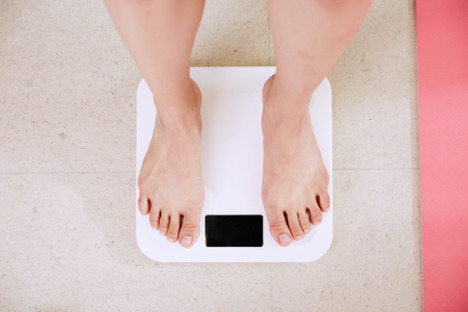
Photo by i yunmai on Unsplash There are significant risks associated with alcohol since alcohol is known to harm health in the long term. As such, you should remain mindful since it can give rise to bad eating habits and render it more difficult to exercise portion size during your HCG diet. Secondly, alcohol can increase your appetite for food. This also works against the low-calorie regimen of the HCG diet. Apart from these, it hinders the fat-burning process by reducing your metabolism, which counteracts the effects of the HCG hormone. These and many others are some of the reasons you want to avoid alcohol during your HCG diet. Conclusion Please make no mistake; alcohol intake while on the HCG diet impacts its effects. Assuming you consume any drink containing enough alcohol, you can expect your weight loss to stall for 3 to 6 days. It's even possible to gain some weight following alcohol intake. Therefore, the best cause of action that will ensure continuous weight loss is to stick to your diet and avoid heavy drinking. If you have to take alcohol, it’s better to wait until you get to the third stage of maintenance before you attempt combining alcohol with your diet. Read the full article
#alcoholanddiet#alcoholandweightloss#alcoholweightloss#hcgandalcohol#hcgandbeer#hcgandwine#hcgdietallowedfoods#hcgdietandalcohol#hcgdietcoach#hcgdietcoaching#hcgdietfamily#hcgdietfoodlist#hcgdietfoods#hcgdietprotocol#hcgdietquestions#hcgdietsupport#hcgweightloss#hcgweightlossfoods#losingweightwithalcohol
0 notes
Text
How Does the Hcg Diet Work: The Science Behind It

How does the Hcg Diet make you lose weight? The scientific explanation.
HCG is the pro-hormone that is found in all individuals, men and women alike. It is produced in large amounts by women during pregnancy and is known for being the catalyst hormone that stimulates the production of other hormones throughout the body. These in turn, effect the body's metabolism, muscle tissue, digestion, liver functions and much more. According to Dr. Sharon Emma (featured on Dr. Oz), HCG does not, cause you to lose weight. Instead, it changes HOW you lose weight. One Doctor's Explanation of How Hcg works for weight loss: It is no secret that hormone function and the balance of hormone functions in the body, is known to be one of the most common causes of weight challenges, especially severe obesity. HCG's role in weight loss, is in how it helps the body to balance out the delicate hormone system, which in turn enables the body to function at an optimal rate of performance.
What is HCG?
"HCG is “Human Chorionic Gonadotropin”. It is a protein hormone made by the placenta of pregnant women. It acts to stimulate precursor hormones in the body called Leuteinizing Hormone (LH) and Follicle Stimulating Hormone (FSH). The elevation of these hormones by HCG prevent the negative feedback loop of high hormone levels in the pregnant female, allowing hormones to go higher than normal. In non-pregnant and males, it serves to elevate hormone levels as well. To what degree the hormones are affected depend on the dose of HCG that is given." HCG is used for fertility in both males and females. In females, HCG given at high levels (10,000 IU) will simulate the spike in FSH that produces ovulation, therefore causing women to ovulate. This is used as a treatment for women with ovulatory disorders. In males, HCG given at high levels will dramatically increase testosterone production and will directly stimulate the leydig cells of the testes to produce sperm. This is used as a treatment for men with low sperm count. Though its use as a fertility drug has been clearly defined and FDA approved, HCG use for weight loss has yet to take this route. Since its discovery, its mechanism has been elusive, and its studies equivocal. The discovery goes back to the 1930’s. A medical experiment involving pubescent obese boys and “pregnancy hormone” led to an observation that these boys developed more muscularity and lost their obesity. The isolated HCG hormone was felt to be responsible. This led Dr. ATW Simeons to pursue an experimental treatment involving HCG injections, obese patients, and a special diet. The results of this study were outlined in the now infamous “Pounds and Inches” manuscript, written by Dr. Simeons in 1971. Once this manuscript became public, it was followed by numerous studies in the 1970’s and early 1980’s that sought to prove or disprove the scientific method of Dr. Simeons. However numerous researchers were unable to prove Simeons claims. Why? I can tell you. The studies looked at the difference in “weight loss” between patients on HCG and placebo not on HCG. The weight loss difference between users of HCG and non-users on the same diet, is about the same, therefore the FDA found no evidence to support the use of HCG for weight loss. However, there is a very clear reason why this was the result. HCG does not produce weight loss by itself. Rather, the diet is what drives the weight loss.- Dr. Sharon Emma Few people know that simple "pauses" in the body's natural functions can cause an inability for the body to process and use fat as energy; the natural purpose for fat. For example; A liver that does not get enough Choline can make it impossible for the liver to process fat. A digestive system that does not have enough of the right hormones to create enzymes cannot properly emulsify foods. This is just two examples out of dozens of possible hold-ups in the body when it comes to processing and expelling fat... that instead shift the body into fat storage mode causing weight gain and obesity. "HCG doesn't really do anything. It's the diet that makes you lose weight." When people state that "HCG hormone does not make you lose weight, but it is in fact the diet that makes you lose weight".... they are right! What they tend not to understand though is that HCG changes HOW you lose weight. According to Dr. Sharon Emma, HCG actually stimulates the follicles on glands which helps the body to maintain muscle tissue. For a scientific understanding, read The NEW HCG Diet which covers how HCG stimulates the follicles of muscle cells and stimulates and enhances the body's natural hormone cycle. The Diet IS in fact what makes you lose weight. HCG simply changes HOW your body loses that weight by keeping your body from going into "diet mode." Rather, the hormone stimulates your body's natural metabolic cycle to run continuously by maintaining muscle mass and stimulating the body's natural hormone cycle. Comparatively, other diets trigger your body to use muscle mass as fuel, and slow the body's metabolism in what is known as "starvation mode." How HCG Helps You Lose Weight What happens when someone does a very low calorie diet without medication? When someone “crash diets”, as would normally occur on a 500 calorie diet, one can drop weight very quickly. However, this weight consists of fat and muscle (lean tissue). Since muscle is very heavy, when you lose it, the scale will drop quickly. It looks good on the scale, but bad on the person, and it destroys the metabolism causing “rebound” or rapid regaining of weight lost. This scenario doesn’t happen with HCG, and when you keep reading, you’ll see why. HCG is an analog of many hormone precursors in the body. This means it stimulates the thyroid, ovaries (in females), testes (in males), and adrenal glands, as well as other tissues in the body that are affected by hormone levels. The main way that HCG is affecting weight loss is by stimulating the production of estrogen, progesterone, and testosterone, in both males and females. The latter hormone, being an anabolic steroid, is largely responsible for the results of HCG treatment. Testosterone, for example, acts to build muscle which is why it is a hormone that has been used for bodybuilding. However, in small amounts, it counteracts the catabolism, or “breakdown”, of bodily tissues during a state of starvation. This acts to preserve muscle tissue during dieting. This preservation of muscle tissue is so important because by preventing its breakdown we preserve metabolism and lean body structure including muscle. This may be why people who claim to lose weight with HCG claim to lose weight differently than with standard weight loss regimens. In standard regimens there is a loss of both fat AND muscle with an overall shrinking of body size. With an HCG regimen, people claim to undergo a reshaping of their body and removal of certain fat deposits. The evidence for this unique change in shape after HCG use with diet is not in the mere weight loss, but in the fact that HCG allows for selective fat loss and the sparing of muscle to produce a change in body composition, which produces a change in shape of the body. Therefore, HCG is not a magic injection. It does not cause weight loss by itself. In fact it doesn't quite fall into this category of drugs. Weight loss drugs that are approved for this purpose produce weight loss of 10% of body weight per year over placebo. HCG does not produce an increase in weight loss above placebo. Rather, like I explained, it changes how weight is lost. Therefore, it is a weight loss ADJUNCT, as I call it, that (during a dieting state) allows for the body to preferentially and selectively burn fat rather than muscle. In addition, many people overwhelmingly claim to be quite comfortable on very little calories with the HCG diet. This so-called appetite effect is very difficult to study. That’s because it has long been known that a ketogenic diet (a diet that produces ketones, like the Atkins diet) has an appetite dampening quality. So is that why HCG patients aren’t hungry? Well, unlike a ketogenic diet, my HCG patients are often not in an extreme state of ketosis, and if they are, it is very mild to moderate. In addition, a decrease in hunger occurs around 48 hours after start of the injections (around the time the hormone peaks in the bloodstream) whereas with a ketogenic diet, it takes nearly a week for hunger to subside. - Dr. Sharon Emma Read the research by Dr. Belluscio here. Read the full article
#hcgdiet#hcgdietarticle#hcgdietcommentary#hcgdietdoctor#hcgdietplan#hcgdietprotocol#hcgdietresearch#hcgdietscience#hcghormone#hcgweightloss#howthehcgdietworks
0 notes
Text
The Hcg Diet Protocol

This precise summary of the HCG Diet protocol includes excerpts directly from Dr. Simeons manuscript, "Pounds and Inches" including the menu for the 500 calorie VLCD (Very Low Calorie Diet.) It is important to note there are modern versions of the protocol that allow healthy food variations, increased calories and a more lenient approach to the diet. You can find these here on Hcg Diet Info as well. The HCG Diet Protocol Summarized While there are a number of new protocol variations, the version described below is the unedited, original summary as outlined by Dr. Simeons himself. The food list and menu description, are also unedited and taken directly from the manuscript. In addition to the these details, you will find notes attached by our expert editors for additional clarification. If you are looking for additional protocol questions, or are simply curious, those can be found in our A to Z Guide to the Hcg diet. If you have questions regarding this protocol, feel free to join the Hcg Diet Forums where we have coaches that are experts on the original diet protocol as well as in homeopathic protocols, and various "rogue" approaches. The Original Hcg Diet Menu Breakfast:Tea or coffee in any quantity without sugar. Only one tablespoonful of milk allowed in 24 hours. Saccharin or Stevia may be used.Lunch: - 100 grams of protein, including veal, beef, chicken breast, fresh white fish, lobster, crab, or shrimp. All visible fat must be carefully removed before cooking, and the meat must be weighed raw. It must be boiled or grilled without additional fat. Salmon, eel, tuna, herring, dried or pickled fish are not allowed. The chicken breast must be removed from the bird - One type of vegetable only to be chosen from the following: spinach, chard, chicory, beet-greens, green salad, tomatoes, celery, fennel, onions, red radishes, cucumbers, asparagus, cabbage. - One breadstick (grissino) or one Melba toast. - An apple, orange, or a handful of strawberries or one-half grapefruit. Dinner:The same four choices as lunch (shown above.) Please take the 100 grams weight seriously, but also take into consideration that you want 100 grams of PROTEIN, and not added salts and additives of your intake. Free Printable: Hcg Diet Protocol Menu According to Nutrition.org, the average American portion size is 50% larger than needed, and is one of the largest contributing factors to the rise of obesity in America. We highly recommend buying a food scale and focusing on portion control as one strategy to train yourself for lifelong healthy eating. These scales are extremely inexpensive (around $10 to $15 on (Amazon) and will immediately save you money on food, while proving to be an inexpensive investment for long term healthy eating. Important Highlights from the Original HCG Diet Manuscript: - The 500 calorie limit must always be maintained. - 2 small apples are not an acceptable exchange for “1 apple.” - Very occasionally we allow egg - boiled, poached or raw - to patients who develop an aversion to meat, but in this case they must add the white of three eggs to the one they eat whole. - Cottage cheese made from skimmed milk is available. 100 grams may occasionally be used instead of the allowed meat option. Particularly for a vegetarian Hcg Dieter, these substitutes can be quite helpful. Here is an additional article on alternative proteins for the vegetarian Hcg Diet. This may be particularly useful for vegetarians or those with aversions to meat but still want to follow the plan. What kind of diet is this? The Hcg Diet is a whole food cleanse, a high protein, green carbohydrate, high vegetable approach to weight loss and healthy eating. The Hcg protocol is NOT a ketosis diet, and if done correctly, ketosis is not necessary for rapid weight loss effects in obese patients, as intended. Benefits of the HCG Protocol The diet is widely known for rapid weight loss results, however there are additional benefits that have made the diet successful: the plan also focuses on helping the individual to adapt to a whole food nutrition plan, understand portion control, and detoxifying the body as a whole. What can I eat on the Original Protocol? Drinks and Seasonings permitted on the HCG Diet based on Dr Simeons original Hcg weight loss protocol as written in Pounds and Inches: - The juice of one lemon daily is allowed for all purposes. - Salt, pepper, vinegar, mustard powder, garlic, sweet basil, parsley, thyme, marjoram, etc., may be used for seasoning - No oil, butter or dressing is permitted - Tea, coffee, plain water, or mineral water (2 liters of water per day is recommended) are the only drinks allowed, but they may be taken in any quantity and at all times. - The fruit or the breadstick may be eaten between meals instead of with lunch or dinner, but not more than than four items listed for lunch and dinner may be eaten at one meal. - No medicines or cosmetics other than lipstick, eyebrow pencil and powder may he used without special permission. Editor's note: Most hcg diet experts today, find there are no issues with cosmetics or similar products that affect weight loss results. Personal care items are believed to be the same, however some individuals do proceed with caution in an effort to achieve the most efficient weight loss rates on the diet. Read more about what to eat on the Hcg Diet here. Original Protocol on Portions: specially prepared unsweetened, low calorie foods "In many countries specially prepared unsweetened and low Calorie foods are freely available, and some of these can be tentatively used... the total daily intake must not exceed 500 Calories if the best possible results are to be obtained, that the daily ration should contain 200 grams of fat-free protein and a very small amount of starch." From Dr Simeon's own Manuscript, "Pounds and Inches." (available here as PDF, MP3 Audiobook, and by table of contents with editor's notes.) Editor's Note: With modern research, we now know that the cleaner the diet, the more efficient the weight loss. We also know that clean-eating can help with transitioning into phase 3 and long term maintenance. Low calorie foods in America tend to be prepackaged, highly processed and difficult for the body to process efficiently. It is highly advised that only "whole foods" are eaten while on the diet plan. Processed foods or prepackaged foods are NOT permitted on the protocol. Please avoid all sweeteners and processed foods as much as possible for more efficient weight loss. In addition, the primary goal while on Phase 2 of the protocol, should always be to retrain the mind and body to follow healthier eating habits. One opportunity with this part of the protocol, is to weed out unhealthy sweeteners completely, and learn to eat whole, unprocessed foods as much as possible. Personal Care and Beauty Products: Highlights from the Original Manuscript: We do permit the use of lipstick, powder and such lotions as are entirely free of fatty substances. We also allow brilliantine to be used on the hair but it must not be rubbed into the scalp. Obviously sun-tan oil is prohibited. Aspirin and birth control are allowed on the Simeons hCG Diet.No massage of any kind. Note: Modern Hcg Diet experts widely approve of massage and light to moderate exercise while on the Hcg Diet Plan. In fact, anything that increases the body's circulation is considered to be a health benefit: before, during and after the Hcg Diet Plan. A short list of HCG-friendly health and beauty products are available here: Recommended HCG Diet-safe products. About Dr. Simeons HCG Injections: Based on the original protocol, Hcg Diet injections (complete guide) the dose for the Simeons protocol is 125 iu of Hcg injections, administered daily, for no more than 40 days. As a modern day modification, Hcg diet drops and tablets (or pellets) are also acceptable in prescription or homeopathic form. Modern acceptable dosages for Hcg injections range from 125ius to 200 ius. Hcg for injections MUST BE high quality, high potency Hcg to be effective and to avoid challenges. A list of sources providing these can be found on our "Buying Hcg injections online" and "Hcg drops online" pages. "Patients who need to lose 15 pounds or, 7 kilos or less require 26 days treatment with 23 daily injections. The VLCD is continued for 3 days following the end of the injections to avoid weight regain." Dr. Simeons Guidelines for hCG Injections: Hcg injections are administered daily. The dose for the Simeons protocol is 125iu administered daily, for no more than 40 days. "When treating only one or two cases simultaneously, vials containing a small number of units say 1000 I.U. should be used. The 10 cc. of solvent which is supplied by the manufacturer is injected into the rubber- capped bottle containing the hCG, and the powder must dissolve instantly. Of this solution 1 .25 cc. are withdrawn for each injection. One such bottle of 1000 I.U. therefore furnishes 8 injections. When more than one patient is being treated, they should not each have their own bottle but rather all be injected from the same vial and a fresh solution made when this is empty.Patients who need to lose 15 pounds or, 7 kilos or less require 26 days treatment with 23 daily injections." The VLCD is continued for 3 days following the end of the injections to avoid weight regain. HCG Diet Injections and the Female Menstrual Cycle "Patients do not take their injections during menstruation, however the VLCD is continued during this time. The individual must reinstate the daily Hcg injection once menstruation is over. Many women simply skip injections on the heaviest flow days." This is only a small amount of the information provided in Dr. Simeons manuscript. Read the entire section on this topic in the manuscript: HCG Diet and the female menstrual cycle Time and hCG Shots "When a patient has more than 15 pounds to lose the treatment takes longer but the maximum we give in a single course is 40 injections, nor do we as a rule allow patients to lose more than 34 lbs. (15 Kg.) at a time. The treatment is stopped when either 34 lbs. have been lost or 40 injections have been given. The only exception we make is in the case of grotesquely obese patients who may be allowed to lose an additional 5-6 lbs. if this occurs before the 40 injections are up." How long do I take Hcg Injections on the Protocol? "When a patient has more than 15 pounds to lose the treatment takes longer but the maximum we give in a single course is 40 injections, nor do we as a rule allow patients to lose more than 34 lbs. (15 Kg.) at a time. The Treatment is stopped when either 34 lbs. have been lost or 40 injections have been given. The only exception we make is in the case of grotesquely obese patients who may be allowed to lose an additional 5-6 lbs. if this occurs before the 40 injections are up." Side Effects There are very few risks with the Hcg hormone and the weight loss protocol. In the Hcg Diet forums on this site, we have seen very few side effects of the protocol. During the Phase 2, some individuals may experience headaches, hunger and cravings, which are typically found to disappear in a few days as the body adjusts to the lack of preservatives, chemicals and processed sugars and carbs. In the event that these do not subside, an Hcg dosage adjustment may be required and is relatively simple to do with the help of your doctor or the advice of our coaching experts in the forums. Read more about side effects of the diet. Modern Day Protocol Modifications While the original protocol continues to be one of the most popular, there are modifications that have become accepted by Hcg Diet experts. These include Hcg drops being added as a legitimate option, the use of coconut oil in very small amounts, and the strong focus on a 4th Phase: long term weight loss maintenance plans and programs. You can learn more about these in our Hcg Diet Guide: How to. Questions? Hcg Diet expert moderators and coaches offer free advice in the Hcg Diet Forums. We are ready to help! Read the full article
#500caloriedietprotocol#drsimeonsprotocol#hcgdietprotocol#hcgprotocol#hcgweightlossprotocol#originalhcgdietprotocol#thehcgdietprotocol
0 notes
Photo

This precise summary of the original HCG Diet protocol includes excerpts directly from Dr. Simeons manuscript, "Pounds and Inches" including the menu for the 500 calorie VLCD (Very Low Calorie Diet.) It is important to know there are modern versions of the protocol that allow healthy food variations, increased calories and a more lenient approach to the diet. https://hcgdietinfo.com/diet-hcg #originalhcgprotocol #drsimeonsprotocol #drsimeons #originalhcgdiet #hcgdiet #hcgdietprotocol #hcgprotocol (at Austin, Texas) https://www.instagram.com/p/CQO3kUDqMQL/?utm_medium=tumblr
#originalhcgprotocol#drsimeonsprotocol#drsimeons#originalhcgdiet#hcgdiet#hcgdietprotocol#hcgprotocol
0 notes
Photo

Read the original Hcg Diet manuscript,”Pounds and Inches, by award-winning endocrinologist, Dr. Alfred Simeons. Free in pdf & audio on Hcg Diet Info. https://hcgdietinfo.com/hcg-diet-simeons-manuscript/ #hcgdietplan #hcgdietprogram #poundsandinches #poundsandincheslost #hcgdietfriends #hcgdietcommunity #hcgweightloss #hcgdietbook #hcgbook #weightlossshot #drsimeons #drsimeonsprotocol #hcgprotocol #hcgdietprotocol #hcgmedicalweightloss #hcgsupport #hcgdietinfo (at Los Angeles, California) https://www.instagram.com/p/CP9bYwojmjD/?utm_medium=tumblr
#hcgdietplan#hcgdietprogram#poundsandinches#poundsandincheslost#hcgdietfriends#hcgdietcommunity#hcgweightloss#hcgdietbook#hcgbook#weightlossshot#drsimeons#drsimeonsprotocol#hcgprotocol#hcgdietprotocol#hcgmedicalweightloss#hcgsupport#hcgdietinfo
0 notes